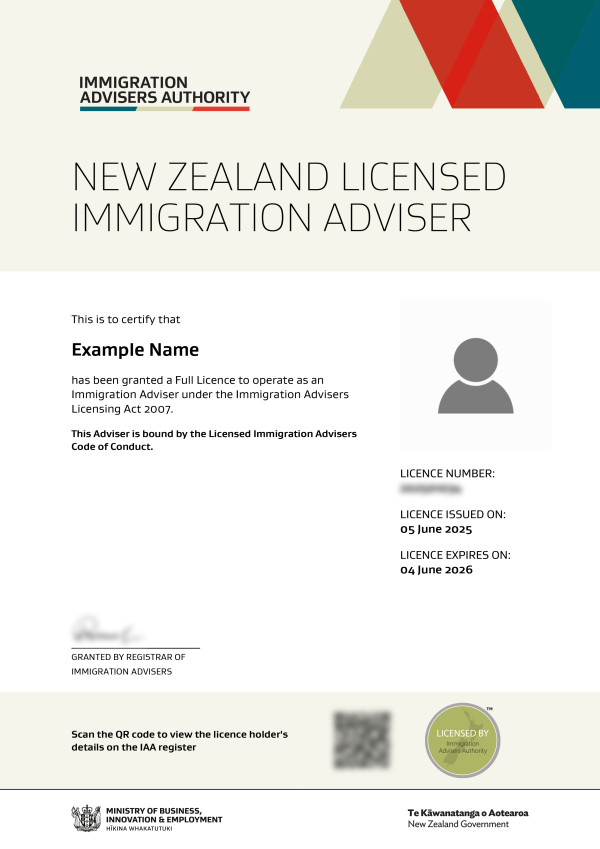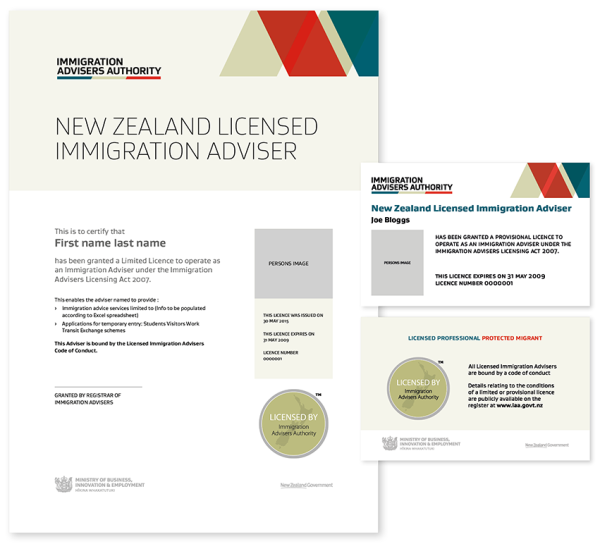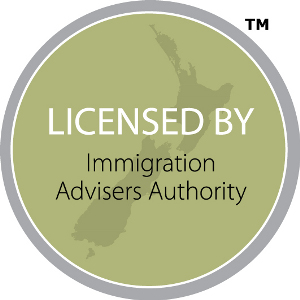Working with a licensed immigration adviser
If you need immigration advice, licensed advisers have specialist expertise.
Why you should use a licensed immigration adviser for New Zealand
Licensed immigration advisers have been issued a licence by the Immigration Advisers Authority. They have specialist expertise, have met the competency standards and follow a professional code of conduct.
The code requires advisers to:
- be honest, professional and respectful
- enter into a written agreement with you that sets out clearly what services they will provide you and what they will cost
- provide you with ongoing timely updates
- charge fees that are fair and reasonable.
Licensed advisers can help you:
- explore all your visa options and choose the right visa
- prepare your visa application
- settle in New Zealand
- assess whether you can appeal a declined visa
- assess your options if you are in New Zealand unlawfully.
Guide to licensed immigration advisers
This guide is available in the following languages:
-
PDF, 1.1 MB
Your guide - English
-
PDF, 1.1 MB
Your guide - Simplified Chinese
-
PDF, 1.1 MB
Your guide - Korean
-
PDF, 2.1 MB
Your guide - Hindi
-
PDF, 1.9 MB
Your guide - Punjabi
-
PDF, 896 KB
Your guide - Samoan
-
PDF, 862 KB
Your guide - Tongan
-
PDF, 869 KB
Your guide - Taglish
-
PDF, 529 KB
Your guide - Vietnamese
Types of licensed immigration advisers
There are three different types of immigration adviser licence.
Full
Can provide you with advice on all immigration matters
Provisional
Can provide you with advice on a full range of immigration matters but must be supervised by a full licence holder
Limited
Can only provide you with advice on certain immigration matters
What does a current licence look like?
Companies cannot be licensed, only individuals can.
Your adviser must have a current licence. We now only issue digital licence certificates, however some advisers may still have a current physical licence card. Licences are valid for one year. To check if an adviser is licensed, you can:
- search for your adviser’s name in the online register of licensed immigration advisers
- ask to see your adviser’s licence certificate – you can confirm the authenticity of the certificate by scanning the QR code
- ask to see your adviser’s physical licence card (if they still have one).
Online register of licensed immigration advisers(external link)

Digital licence card

Physical licence card
Trade mark
Some advisers may choose to display the below trade mark on their website. If they do, their name and licence number must be displayed next to the trade mark.

Non-current licence
There are several reasons why an adviser’s licence may not be current. The licence status may be expired, surrendered, refused, suspended or cancelled.
How must an immigration adviser behave?
Your adviser must follow a set of ethical and professional standards when dealing with you. The full standards are set out in the Licensed Immigration Advisers Code of Conduct.
The code of conduct ensures that your licensed immigration adviser will:
- show you evidence that they are licensed
- be honest, professional, diligent and respectful
- conduct themselves with due care and in a timely manner
- provide you with objective advice
- declare any conflicts of interest, including any commission they will receive, and seek your approval to continue to act for you
- provide you with a written agreement for you to sign before any work is started which sets out the services to be provided and the fees
- charge fees that are fair and reasonable
- provide you with invoices with full descriptions of what the fees relate to
- let you know when your application has been lodged and provide you with on-going timely updates
- keep your personal documents safe and return them to you in a secure manner.
Professional standards leaflets
Licensed immigration advisers must give and explain this professional standards leaflet to every client. These leaflets are available in:
Problems with your adviser
Firstly, discuss your problem with your adviser. Explain your concerns clearly, and suggest how your adviser can resolve them. Your adviser must follow their internal complaints procedure to help fix the problem.
Make a complaint to the Immigration Advisers Authority if you cannot resolve the problem with your adviser or it is not appropriate to deal with your adviser directly.
